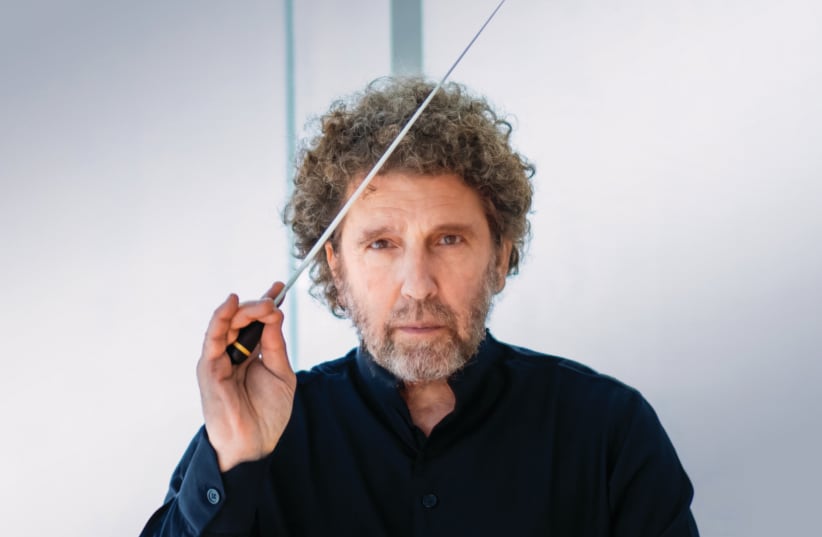Times change, and religious women are now offered a choice: to break up their community or offer their necks to the guillotine’s blade. Inspired by the 1794 martyrdom of the Compiègne nuns during the Reign of Terror, Francis Poulenc’s deeply moving Dialogues des Carmélites, an opera about the power of faith first produced in 1957, is offered for the first time at the Israeli Opera under the baton of conductor Asher Fisch.
“I wanted to conduct this opera for years. Here, I finally got a chance to do so,” Fisch told The Jerusalem Post.
“This opera is built on the female voice,” he added. “Almost all its characters are women.”
The harmony of Catholic culture
“It is a spoken opera with an unusual wealth of musical colors,” he noted. “The dialogues sound emotional thanks to the orchestra, but most of it is recitativo accompagnato. Poulenc’s brilliance,” he suggested, “was in harmony.”
In this opera, Poulenc, who describes himself as partly naughty and partly a priest, offers a very profound exploration of Catholic culture.
Based on the 1949 screenplay by Georges Bernanos, an adaptation of the 1931 novella The Song at the Scaffold by Gertrud von Le Fort, the opera introduces the audience to the unique community of the discalced (barefoot, living in poverty) Carmélites via the character of Blanche, the heroine of this opera. (Yael Levita and Shaked Strul alternate in inhabiting the role.)
Created by Le Fort, Blanche is a highly idealistic noblewoman who seeks freedom through religious discipline. It is through her eyes that this historical drama is seen.
The Christian order that Blanche joins, formed in 1562 by Teresa of Avila and John of the Cross, is inspired by the words of the biblical prophet Elijah: “I am moved by zeal for the eternal, the God of Hosts” (I Kings 19:14.) The Carmel Mountain is where the Hebrew prophet offered the People of Israel proof that the Ba’al was a false idol. To get better acquainted with the order, the Israeli Opera singers and musicians will visit the Monastery of Our Lady of Mount Carmel, a French-speaking nunnery that still offers the charism (spiritual gift) of the order to the world.
The spiritual gift of the order, an older nun tells Blanche during the opera, is constant prayer. She warns Blanche that those who despise religion view the nuns as parasites, as these extreme atheists are blind to the spiritual value of prayer.
By extension, it is also possible to view the gift of human prayer as a stand-in for music and opera itself. Poulenc’s follow-up opera, produced in 1958, was indeed titled La Voix Humaine (The Human Voice) and depicts the last telephone conversation between an abandoned woman and her former lover.
The community of nuns depicted in the opera is highly idealized, with the older nuns offering a wonderfully wise balance between strict discipline and warmth. Blanche selects her name in the order, Blanche of the Agony of Christ, and we are informed that, like in the Eagle’s Hotel California, those who enter the Garden of Gethsemane can never leave.
When asked how the Israeli audience might respond to such powerful imagery, which functions in a very different religious framework, Fisch joked that “this might be treif,” non-kosher food such as ham, “but it is really good treif.”
On a more serious note, Fisch told the Post that, growing up in Jerusalem, he visited the churches in the Old City to enjoy Catholic liturgy, as it offered something that he could not find in Jewish prayer.
“Jewish prayers, at least the ones I attended, were cacophonic, with people singing off-key and at different times,” he shared. “Christian prayers had harmony.”
He emphasized that, as a non-religious person, he values the great culture created by all faiths.
A NOBLEWOMAN, Blanche must face the grim specter of the French Revolution. During the Reign of Terror, the State banned religious community life, ordering the nuns to don secular clothes and stop collective prayers. During the same year that the nuns faced this difficult test, the French State offered citizens another faith instead of Christianity: the Cult of Reason. Soon replaced by the Cult of the Supreme Being, Napoleon banned it in 1802.
In a very ironic scene (Citoyennes ,nous vous félicitons,) a guard informs the nuns that their compliance with the law will be rewarded with a printed permit to “live in freedom under the watchful eye of the law.”
As devout Christians, the nuns do not rush to seek the end of martyrdom, acknowledging that such a high honor could be as inappropriate as asking a servant girl to sit on a royal throne, but they also do not flee from this fate.
During the emotional peak of the opera (Salve Regina) the audience sees them being led to their beheading with the horrific sound of the blade dropping as an integral part of the music.
Any state could become morally bankrupt and use coercion against the women - and men - living in it, so the opera might be viewed both within Catholic tradition and in a wider context.
For example, what should be the moral response to a state that allows people to perish in service of an allegedly rational aim or a supreme goal?
“The current government is exactly like the evil regime created after the French Revolution, as is depicted in this opera,” Fisch told the Post.
Dialogues des Carmélites by Francis Poulenc will premiere at the Israeli Opera on Tuesday, May 28, at 7:30 pm with more shows offered until Monday, June 3, at 6 pm Ticket prices range between NIS 195 and 455. Sung in French with English and Hebrew titles. Two hours and forty-five minutes, one intermission. Call (03) 692-7777 for bookings. The Israeli Opera, 19 Shaul Hamelech St., Tel Aviv.

